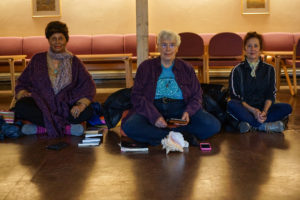About Deep Listening

Deep Listening, as developed by Pauline Oliveros, explores the difference between the involuntary nature of hearing and the conscious nature of listening. The practice includes bodywork, sonic meditations, and interactive performance, as well as listening to the sounds of daily life, nature, one’s own thoughts, imagination, and dreams. It cultivates a heightened awareness of the sonic environment, both external and internal, and promotes experimentation, improvisation, collaboration, playfulness, and other creative skills vital to personal and community growth.
Inherently collaborative, the first published Deep Listening scores and activities (Sonic Meditations, 1971) were workshopped in the context of a female-identified collective, the fem-ensemble, over a period of many months. From the 1980s onwards, Deep Listening workshops, retreats, and the Deep Listening Certification Program were developed and facilitated in close partnership with playwright IONE (also Oliveors’ life partner) and movement artist Heloise Gold. Today, the philosophy and practice of Deep Listening continues to evolve through a growing international community of listeners.
Pauline Oliveros on Deep Listening
“What Is Deep Listening?
For me Deep Listening is a life long practice. The more I listen the more I learn to listen. Deep Listening involves going below the surface of what is heard, expanding to the whole field of sound while finding focus. This is the way to connect with the acoustic environment, all that inhabits it, and all that there is.
Deep Listening is a practice consisting of listening and sounding exercises and pieces I and others have composed since 1970. The results are processed by group discussions in workshops and retreats. Deep Listening is for musicians as well as participants from other disciplines and interests. Previous musical training is not required.
The key to multi-level existence is Deep Listening – listening in as many ways as possible to everything that can possibly be heard all of the time. Deep Listening is exploring the relationships among any and all sounds whether natural or technological, intended or unintended, real, remembered or imaginary. Thought is included. Deep Listening includes all sounds expanding the boundaries of perception.
We open in order to listen to the world as a field of possibilities and we listen with narrowed attention for specific things of vital interest to us in the world. Through accessing many forms of listening we grow and change whether we listen to the sounds of our daily lives, the environment or music. Deep Listening takes us below the surface of our consciousness and helps to change or dissolve limiting boundaries.
Deep Listening is a birthright for all humans.”


